by Jenny Hoops
Have you been thinking about publishing an audiobook?
The audiobook market today is still in a tremendous growth curve. The Audiobook Publishers Association (APA) reports remarkable double-digit growth for each of the last eight years, with 16% growth in dollar sales and 28% growth in terms of unit sales in 2019.
This means that the number of audiobooks sold has gone up, and the average price the consumer has paid has gone down. And I think that is great news for both authors and listeners. It means that there are more people listening, and they are able to afford more audiobooks.
Audiobooks Give People More Opportunities for Reading, and That’s Good for Authors
It’s funny how many people still think of audiobooks as “Books on Tape for the Blind.” But the demographic of listeners has really changed in the last 15-20 years.
Now, the audiobook is the preferred book format for BUSY people, and who isn’t busy these days? “Hey, Alexa – play my audiobook” is how busy people do housework and prepare for their bookclub all at the same time. Or privately listen to a racy novel through their earbuds while their kids are home-schooling at the kitchen table. Or catch up on their college assigned-reading while delivering Skip-the-Dishes or Amazon packages.
(Authors can learn from audiobooks too: “The Best Writing Teacher You Can Get for 20.“)
These days, audiobooks are expanding the opportunities people have in their day for reading, and that translates into more unit sales for authors.
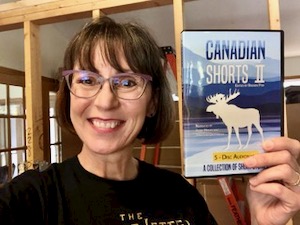
Publishing an Audiobook Today Means Creating a Digital Download
And here’s another fascinating trend in audiobooks: digital downloads are quickly becoming the only format worth producing.
In 2015, digital downloads (e.g. Audible, Kobo, Overdrive, Hoopla) were 86% of all audiobook sales, followed by 15% in audio-CD sets, and 1% other formats such as streaming audio and book+CD sets.
By 2019—only four years later!—the percentage of audiobooks that were digital downloads grew to an overwhelming 97.5%.
You read that right—virtually ALL audiobooks are now accessed as digital downloads, with physical CD sets coming in a distant second at 2%. Which makes a lot of sense. After all, how many of us even own a CD player any more? My 2014 Subaru has a USB port, but no CD player, and certainly no cassette player!
So that means indie authors no longer have to press hundreds of CDs and store them in their basements hoping to sell them before the format is obsolete.
Why Should a Writer Care About Publishing an Audiobook?
But why should writers care about audiobook listeners? Aren’t audiobooks just cutting into the e-book segment of the writer’s audience?
Actually no—audiobook listeners are a whole new demographic. They do not purchase e-books or printed books at the same rate as they are consuming audiobooks now. The readership for authors who publish in all three formats (print, e-book, audio) is growing, and the audiobook listeners are driving that growth.
Because of the ease of digital downloads, audiobook listeners are voracious. They will purchase an entire series and binge-listen, or download a favorite author’s entire backlist, if it’s available in audio format.
And the store is never out-of-stock! If the audiobook has been produced, it is available for download. (There is a licensing rights issue for libraries, though, that restricts the titles available to library patrons. That’s a whole other discussion that has been ongoing for a few years.)
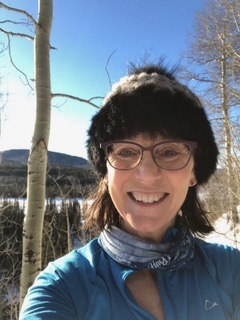
How I Got Into Producing Audiobooks
My background is typical for someone who doesn’t know what they want to do when they grow up.
I’ve lived in four Canadian provinces. I studied science in university, working as an environmental inspector after I graduated. I’ve had a pretty varied career after that.
I became a motivational speaker (ever heard of “Canada’s Sexy Optimist”? It was a great tag line for the 90s!); followed by publishing motivational books and daytimers, then community soccer league coordinator, and then a newsreader for a broadcast channel for visually-impaired listeners.
It seems like my whole life has been gradually building to the technical, creative and logistical enterprise that is audiobook production!
As for how I got into audiobooks, well, it was serendipity! I had just moved with my family to a rural property and was looking for a business that I could do from home while my kids were at school. On a whim, I decided to take a weekend course, “Intro to Audiobooks,” and I was completely hooked!
Before that, I don’t think I had ever realized that narrating audiobooks was a JOB that people did! And wow, it’s been nearly seven years since I started narrating professionally. The industry has changed, the audiobook market has changed, and my approach to producing audiobooks has changed.
I tell my authors that the entire industry undergoes a revolution every six months, so we should be nimble and willing to try new ideas.
An Indie Author Can Do Things the Big Publishers Won’t Do When Publishing an Audiobook
The audiobook industry is still the new kid on the block as far a book publishing goes. That means producers like me are free to try new ideas and expand into markets that haven’t traditionally recorded audio editions.
For that reason, I especially like working with indie authors and small publishers. They are open to trying anything that the “big publishers” won’t do, like adding music and sound effects, multi-voice casting, or publishing the audio on different platforms to reach more listeners.
Lately, I have realized that many indie authors (particularly non-fiction) should be narrating their own books so they can maintain their brand across all the publishing formats. But for most authors, it is too hard to figure out how to record their book so that it meets rigorous audiobook specifications.
So, I’ve been working for a while now to develop a course that gives authors the knowledge and confidence to self-record. And I am about to launch the course online—look for it on Thinkific in March 2021!
3 Things to Look for When Hiring an Audiobook Producer/Narrator
1. The most critical question to ask a prospective producer/narrator is: have they produced an audiobook before?
I know that sounds way too simple, but believe me, the only way to make sure the narrator you hire can complete the job is to ask for evidence of prior experience.
You do NOT want to hire a complete newbie just because they “have a nice voice.”
I hate to say it, but “nice voices” are a dime a dozen. When you hire a producer, you are expecting that they already have the technical skills, and they work in a suitable recording studio.
There are many, many authors who have been burned because they signed a contract to produce an audiobook and then months later, hear nothing but crickets from the so-called narrator. If they have produced even one audiobook, then they know what they’re getting into and will probably be able to finish your job.
2. The next thing an author should inquire about is the narrator’s availability.
It takes about three weeks of full-time work (usually more) to produce an average-length audiobook, and most narrators book out a few months in advance.
This becomes important for the author if you are trying to coordinate the publication of the e-book, print book and audio book. You should be looking for the audiobook producer when you are working on your final edits so that the narrator is available to start when you have the edited proof copy.
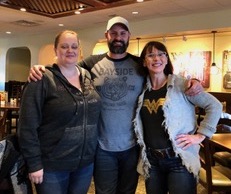
3. And the last-but-not-least thing an author needs to do is carefully listen to the narrator’s samples and audition submission.
(And you’ve already carefully chosen a 5-minute, 800-1000 word selection of your text for the audition script that is representative of the book, right?)
Do you like the sound of their voice? Does it fit with your image of your MC? You don’t need to get the “perfect” narrator, but you DO need to smile when you hear their voice say your words.
Top 2 Mistakes Authors Make When Publishing an Audiobook
1. The biggest mistake authors make is waiting too long to produce the audiobook edition after they launch their e-book/print book.
Ideally, all editions of the book (print/e-book/audiobook) should publish at the same time. That way, you only need to invest in one big marketing blitz for the launch.
Publishing your backlist is great for your super-fans, but it takes a concerted marketing effort to sell an audiobook edition of a backlist book when listeners are hoping for new material.
2. Another mistake authors make is to distribute only through Audible.
Instead, take advantage of wider distribution options like the library market, Chirp, and the many other audio distributors.
Authors should have a good understanding of their audience and where they download their audiobooks, and choose the distribution option that is targeted to their specific audience.
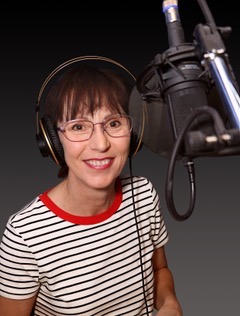
What Can You Expect to Pay When Publishing an Audiobook?
The production cost of an audiobook is calculated using your book’s word count.
Each finished hour of audio is roughly 9,300 words. The industry standard rate for audiobook production varies from around $250 to $600 or more per finished hour (PFH). Independent, home-studio narrators generally charge at the lower end of that scale. Full-cast or in-studio productions will understandably cost more due to the additional sound engineering requirements.
So, a 70,000 word manuscript would be a 7-1/2 hour audiobook, which (depending on your narrator/producer choice) would cost you $2,000 – $4,500 (or more).
Alternatively, you might choose to enter into a royalty-share arrangement with the narrator, and then your initial costs would be much lower. Your royalty income from sales, however, would be cut in half.
Royalty-share production is very attractive for authors who pay nothing up front for production. They’re a lot less satisfactory for narrators, though, who risk making no money at all for their production work if the author does not work hard to sell the audiobook edition.
My worst-selling royalty-share audiobook has sold a grand total of 8 copies (and so I made pennies for a month’s work). My best-selling royalty-share audiobook has sold thousands.
Advice for an Author Considering Publishing an Audiobook
I would say, Go for it! Authors who want to produce their own audiobooks are my favorite people.
I believe that non-fiction authors (especially professional speakers or lecturers) SHOULD be the voice we hear in the audiobook if they are serious about their brand consistency. And if they already have some knowledge of the audio recording and editing software, they will save a lot of money by self-recording. Those are the pros.
But the cons can quickly outweigh the pros. Things like the cost of purchasing a suitable microphone and editing software and the time it takes an author to learn how to use the equipment can be overwhelming.
And even if the author sets up a perfect home studio and is familiar with the editing software, many authors aren’t prepared for the long hours of work to produce good-quality audio. Or they end up hiring a narrator and audio engineer anyway after trying and not being happy with their efforts.
A Course for Authors Wanting to Publish Their Own Audiobooks
Narrators must read with a conversational, pleasant voice without any errors. And fiction narrators must be able to read with a variety of character accents so that each character’s sound is distinctive to the listener. All of that takes time to produce.
Even seasoned pros, like me, need two hours or more to record every finished hour of audio. And the editing takes another 3 or 4 hours for each finished hour of audio. Which means your 70,000 word manuscript, which finishes up at 7.5 hours of audio, will take 60 hours of work—if you know what you’re doing and you are reasonably efficient.
Like I said earlier, a lot of newbie narrators never finish their first audiobooks because they get overwhelmed and quit.
My soon-to-be-launched online course is designed specifically to teach authors to narrate and edit their own audiobooks. It provides easy-to-follow instructions and tips so you can create an audiobook that you’re proud of. (Find more information below.)
Publishing an Audiobook Helps an Author Expand Their Reach
I know many authors are hesitant about audiobooks because it’s a lot to learn about a different medium. But the great thing about audiobooks is that it can introduce an author to a whole new audience, and that drives sales across all platforms.
And the most wonderful thing about audiobooks is that the narrator and production team are all in the author’s corner, working to make the audio edition the very best it can be. Narrators are proud of their work and want every audiobook to be a best-seller.
I think creating an audiobook edition is the best way for authors to expand their reach and power beyond the traditional text audience.
* * *
 Jenny Hoops is an audiobook narrator/producer who works with indie authors to create great-sounding audiobooks. She has narrated over 40 full-length books, both fiction and non-fiction, and recorded thousands of news articles as one of the dependable voices of The Washington Post for Audible.
Jenny Hoops is an audiobook narrator/producer who works with indie authors to create great-sounding audiobooks. She has narrated over 40 full-length books, both fiction and non-fiction, and recorded thousands of news articles as one of the dependable voices of The Washington Post for Audible.
Jenny believes that every book deserves to be heard, and she is passionate about helping authors publish audiobook editions that sell. Watch for her upcoming on-line course, “Audiobook Narration for Authors,” coming soon to Thinkific!
Jenny lives in the foothills of the Rocky Mountains with her husband and their two sons and a really nice golden retriever. She is the founder of Snowdog Audio and records in Snowdog’s world headquarters in Bragg Creek, Alberta.
For more information on Jenny and her work, please see her website, listen to her audiowork on Audible, or connect with her on LinkedIn, Facebook, Twitter, and Instagram.
Listen here for Jenny’s audio sample (Muriel is abducted by aliens, in Canadian Shorts II December 2020):

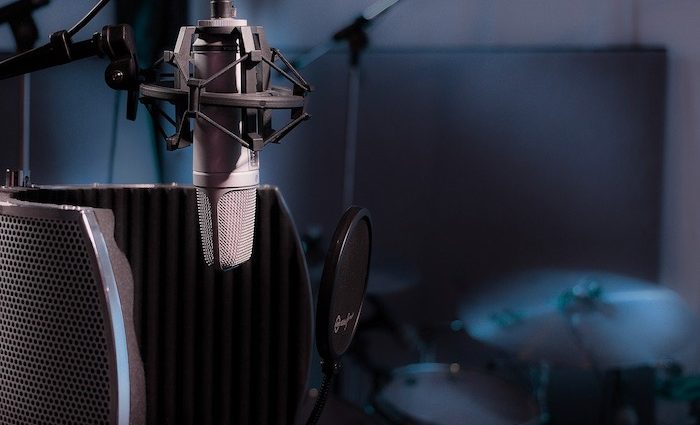
Wonderful article, Jenny! Great advice for authors here on having their book made into audio.
Best!
Lee Ann